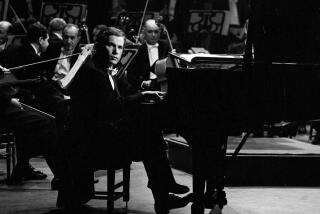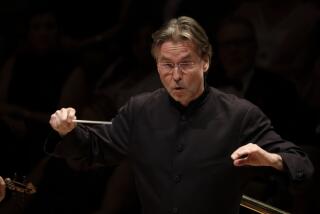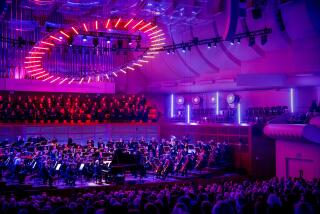Technology is infringing on classical music
Popular music and classical music may be distinct genres with their own traditions and social mores, but cross-pollination has long been the way of most musics. If nature abhors a void, she adores a hybrid.
Jazz, for instance, developed when 19th century African Americans filtered the waltz and other aspects of Western music through African musical traditions, producing a new language to express their situation in America. Take a peek at 21st century Brooklyn, which John Adams called the new Montmartre at a Green Umbrella concert last season. No one seems to have told the composers in their late 20s and early 30s who flock to that borough that indie rock isn’t an integral part of classical’s new music tradition.
As for the rock world, it’s been getting ideas for years from the innovations of new music. Frank Zappa considered the mother of all musical inventions to be the experimental composer Edgar Varèse. Radiohead knows its Messiaen; Björk, her Meredith Monk; Sonic Youth, its John Cage.
All of this is as it should be — natural, healthy and artist-driven. It is also an excellent way to build new audiences. I became interested in Icelandic rock band Sigur Rós thanks to the Kronos Quartet’s advocacy. Sigur Rós fans now attend Kronos concerts.
Hand in hand with this exchange of musical ideas has been an enthusiastic exchange of technology. Much electronic equipment that fuels pop has its roots in classical’s experimental wing. Pop makes it own modifications and then hands them back. The instrument of Steve Mackey, who heads Princeton’s venerable composition department, is the electric guitar.
But something has suddenly gone terribly wrong in this mutual musical wonderland of give and take. The technology is starting to take over. The exchange is becoming one-sided. And artists are being left out of the future of music by marketeers. Just because you can, Marshall McLuhan said about the application of technology to media and the arts, doesn’t mean you should.
What is setting me off is a story this month in The Times about the uneasy marriage of music and technology, which includes symphony orchestras inviting audiences to wile away an hour with Tchaikovsky by tapping on their smartphones and iPads. I was heartened that reader comments about the desirability of these digital devices in the concert hall have been almost exclusively negative, pointing out that light is a disruption and that tweeting is an engagement in tweeting, not music. That’s hardly surprising. People who care about music are the ones who are truly engaged, and they are going to take the trouble to respond. Tweeters have already moved on.
This has nothing to do with technophobia but with big and serious issues, and ones that go beyond classical music. But first let us note who is primarily advocating bringing phones and tablets into the concert hall. Social media consultants are increasingly being hired by orchestras and other arts institutions and given the mandate to fill theaters and museums with young bodies by creating online video games, misleadingly marketing classical music as if it somehow related to pop culture like, say, reality TV. Any novel idea to scam the social networking system to get the word out is apparently also OK.
Unfortunately, if the scammers have their way, the result could be an updated “Invasion of the Body Snatchers.” Treating classical music as if it were pop culture is no attempt to move an art form in a new direction but rather to find a convention for everything. We’re not talking pop people but pod people impelled to respond in a certain, single way. Technological fascism is not, I think, too strong a term for it.
Classical music covers an enormous range historically and stylistically. And listeners bring a wide range of experience, expertise and artistic needs to the concert hall. Listening, moreover, is a personal act.
Some may enter into a dialogue with history. What, for instance, can Beethoven’s affirmation offer us politically today? Others may be more concerned with their personal relationship, their own history, to a specific work. There are those for whom the music will be something unfamiliar to be encountered in any number of ways. Maybe falling in love with the sounds of a piece will be your bliss. A writer friend of mine loves to fantasize at orchestral concerts, using them as an inexhaustible source of ideas.
The important point is that a classical concert provides an opportunity to untie the digital umbilical cord and replace it with chords that really do resonate. I don’t know about you, but I find turning off the cellphone a liberating experience. For those who say this is alien to young people who know nothing else but being perpetually online, let the prospect for a new experience be the attraction.
The penultimate track of the the White Album is the electronic collage “Revolution 9,” which was inspired by the experimental music in the ‘60s of Cage and Stockhausen. Was this the result of the Beatles being called in to a meeting with a marketing director telling them they must find a way to build a new audience among listeners of avant-garde music? Or were the Beatles, in hybrid mode, opening new vistas for their fans? There was no dancing, no singing along, no screaming to “Revolution 9.” We had to sit down and listen, and we did.
New technology will surely continue to play a necessary role in the development of music, popular and classical, as it always has. The doors leading to the corridors separating pop and classical must remain wide open. But audiences deserve the opportunity to approach something new without being told what to expect and be allowed the mental space to take it in. When we are in a situation where everything in life is forced to be the same, we don’t usually call that freedom.
Freedom is the real issue. Is the role of technology to open us to new possibilities or is it, as more and more in Silicon Valley are trying to do, to enmesh us in an environment envisioned by Apple or Google? Already iTunes has forced classical music into a pop straitjacket, whether by an infrastructure that recognizes music as consisting only of songs, or through its severely constricted audio.
The latest villain on the scene is Spotify, the Swedish music-streaming service that has just reached the U.S. and theoretically puts an enormous variety of music at your fingertips. But Brian Brandt, whose Mode Records specializes in experimental composers, recently wrote on the website New Music Box that Spotify seems poised to drive him and other small labels out of business, because its model supports only pop bestsellers. Mode simply can’t survive on a payment of one-third of a cent per stream. Nor will you likely learn much new from a service like Pandora, which is programmed to find more music like that which you already know.
Musicians must, obviously, earn a living, and we all count on musical institutions to come up with business models that allow them to survive. But ultimately, holistic hearing comes from within — within music and within ourselves. Real innovation is what we don’t expect and tends to come when we don’t expect it. Only open ears and alert antennae will recognize the next important hybrid. Sorry, folks, but Mozart won’t make you smarter unless you switch off your smartphone.
More to Read
The biggest entertainment stories
Get our big stories about Hollywood, film, television, music, arts, culture and more right in your inbox as soon as they publish.
You may occasionally receive promotional content from the Los Angeles Times.







